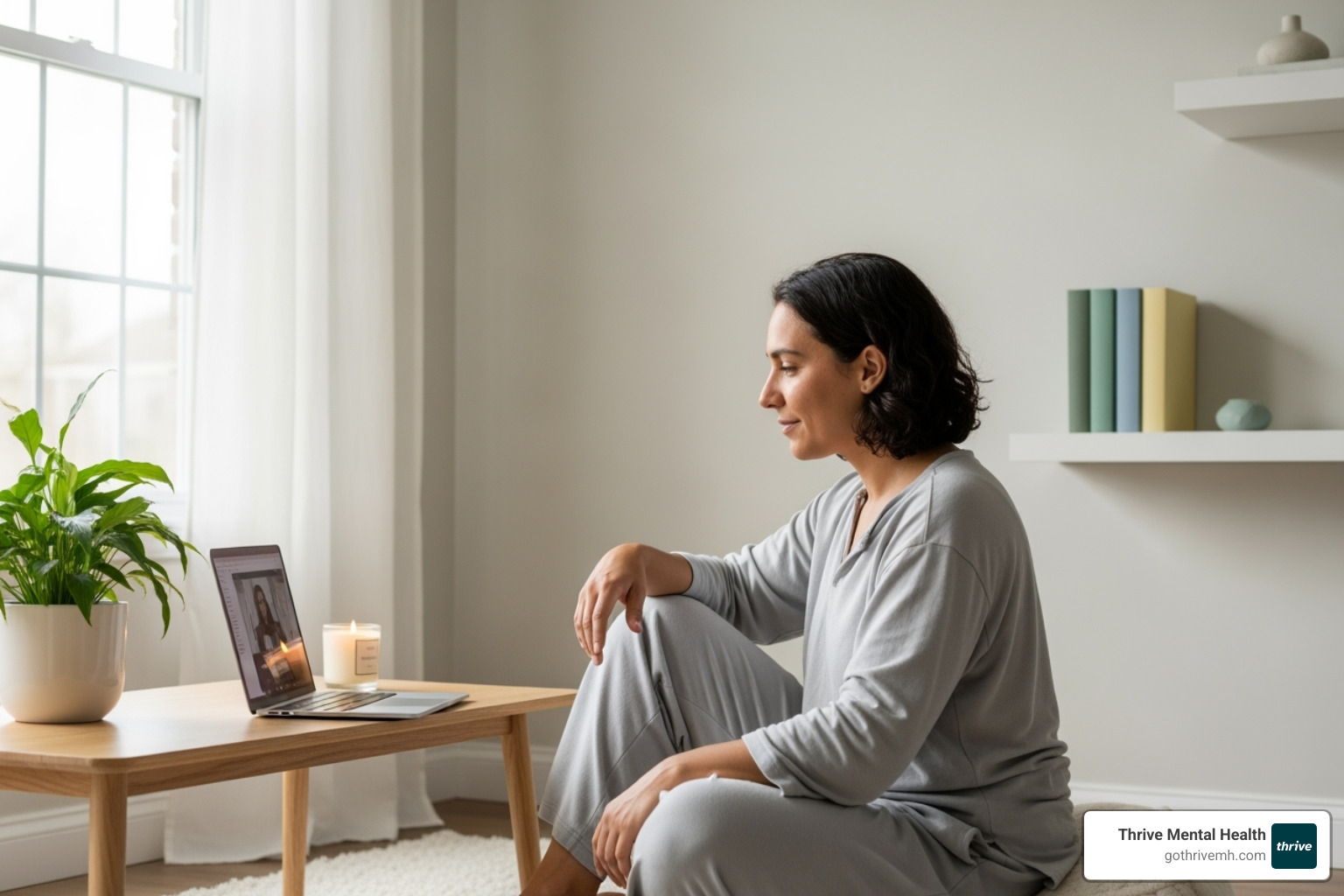The Definitive Guide to Intensive Outpatient Programs

What is an Intensive Outpatient Program (IOP)?
An Intensive Outpatient Program (IOP) is a flexible, structured mental health treatment program. It allows individuals to receive comprehensive care while still living at home and managing daily responsibilities like work or school.
Here’s a quick look at what an IOP offers:
- Structured Care: It’s a non-residential program with multiple hours of therapy sessions each week.
- Conditions Treated: IOPs help with mental health disorders (like anxiety, depression, trauma) and substance use disorders. They are for those who don’t need 24/7 supervision or medical detox.
- Treatment Approach: You’ll find a mix of group therapy, individual counseling, educational sessions, and often family support.
- Flexibility: IOPs bridge the gap between traditional weekly therapy and full-time inpatient care. They’re ideal if you need more support but can’t put your life on hold.
Life can be demanding, and finding effective mental health support that fits your busy schedule can feel impossible, especially for busy professionals and adults in Florida. Many people find traditional weekly therapy isn’t enough, but inpatient treatment is too disruptive. This guide will help you understand if an Intensive Outpatient Program is the right fit for you.
As CEO of Thrive, I champion growth and innovation in behavioral health, focusing on impactful solutions like Intensive Outpatient Programs. My work at Lifebit also drives healthcare innovation, ensuring data-driven strategies improve patient care. We’re here to help you find care that truly works for your life.

An Intensive Outpatient Program (IOP) represents a vital middle ground in the spectrum of mental health and addiction treatment. It’s a structured, non-residential psychological treatment program designed for individuals who require more support than traditional weekly therapy can provide, but who do not need the 24-hour supervision or medical detoxification offered by inpatient or residential programs.
The core idea behind an Intensive Outpatient Program is to provide a significant amount of therapeutic intervention while allowing individuals to maintain their daily lives. This means you can continue to live at home, attend work or school, and engage with your family and community, applying the skills you learn in therapy directly to your real-world situations. It’s about building coping skills, finding solutions, enhancing self-care, and striving for a healthy balance in all aspects of life. Research consistently shows that IOPs are highly effective, with some studies indicating that they can be as beneficial as inpatient treatment for many individuals struggling with substance use disorders. You can explore the Evidence for IOP effectiveness to learn more about the robust research supporting this level of care.
Who is a Good Candidate for an IOP?
We often find that individuals seeking an Intensive Outpatient Program share common characteristics that make them ideal candidates for this level of care. If you’re wondering if an IOP is right for you, consider the following:
- Stable Living Environment: A crucial factor for success in an IOP is having a safe and supportive home environment where you can return between sessions. This stability helps reinforce the skills learned in treatment.
- Motivated for Change: While an IOP provides significant structure and support, it also requires a strong commitment to recovery and personal growth. Your motivation to engage actively in the therapeutic process is key.
- Not an Immediate Danger to Self or Others: IOPs are not suitable for individuals who require immediate crisis intervention or 24/7 supervision due to severe symptoms, active suicidal ideation, or a high risk of harm to themselves or others. Those situations typically necessitate a higher level of care, such as inpatient hospitalization.
- Needs More Than Weekly Therapy: If you’ve been attending traditional outpatient therapy but find your symptoms are worsening, you’re not making sufficient progress, or you need more frequent and comprehensive support, an IOP can provide that crucial “step-up” in care.
- Transitioning from Residential Care: Many individuals transition to an Intensive Outpatient Program after completing a higher level of care, such as inpatient or Partial Hospitalization Programs (PHPs). An IOP serves as an excellent “step-down” to help you gradually reintegrate into daily life while maintaining a strong support system. As NAMI highlights, structured outpatient programs like IOPs are invaluable for continued recovery. You can read NAMI’s view on structured outpatient treatment to understand their importance in the recovery journey.
- Able to Manage Daily Responsibilities: The flexibility of an IOP allows you to continue with work, school, or family obligations. If you are able to balance these responsibilities with a rigorous treatment schedule, an IOP could be a perfect fit.
Conditions Treated in an IOP
Intensive Outpatient Programs are incredibly versatile and can effectively treat a wide array of mental health and substance use conditions. Our programs in Florida are designed to address the complex needs of adults and young professionals, offering specialized care for:
- Substance Use Disorders: This includes comprehensive treatment for various addictions, such as:
- Alcoholism
- Drug addiction (e.g., opioid, cannabis, cocaine, stimulant dependence)
- Other addictive behaviors like gambling, gaming, or internet surfing.
- Mental Health Disorders: IOPs provide intensive support for a range of mental health challenges, including:
- Depression and other mood disorders (e.g., bipolar disorder)
- Anxiety disorders (e.g., Generalized Anxiety Disorder, Social Anxiety, Panic Disorder, OCD)
- Trauma and Post-Traumatic Stress Disorder (PTSD)
- Personality disorders
- Self-harm
- Serious Persistent Mental Illnesses (SPMIs)
- Eating Disorders: Specialized IOPs can provide crucial support for individuals struggling with disordered eating and body image challenges, often integrating nutritional guidance and therapy.
- Co-occurring Disorders (Dual Diagnosis): It’s common for individuals to experience both a mental health disorder and a substance use disorder simultaneously. IOPs are well-equipped to provide integrated treatment for these co-occurring conditions, addressing both aspects comprehensively for holistic healing.
A Closer Look at the Structure of an Intensive Outpatient Program

When you step into an Intensive Outpatient Program, you’re entering a carefully crafted treatment experience that respects your life while providing the intensive support you need. Think of it as having your cake and eating it too – you get comprehensive mental health care without having to press pause on everything that matters to you.
The beauty of an IOP lies in its flexibility. You’re not checking into a facility for weeks or months. Instead, you’re building a structured routine that works around your existing commitments. Whether you’re a young professional in Tampa Bay climbing the career ladder or someone in Central Florida managing family responsibilities, an Intensive Outpatient Program adapts to fit your world.
A Typical Week and Program Length
The word “intensive” might sound intimidating, but it simply means you’ll be more engaged in your healing journey than traditional once-a-week therapy allows. Most participants spend 9 to 20 hours per week in their IOP, typically spread across 3 to 5 days.
We get it – life doesn’t stop for treatment. That’s why our flexible IOP programs in Florida offer morning sessions for those who work afternoons or evening sessions for the 9-to-5 crowd. Some people even mix and match to create a schedule that works perfectly with their routine.
The program duration usually ranges from 8 to 12 weeks for the intensive phase, though some people benefit from longer programs. Think of it like learning a new skill – some people pick up guitar in a few months, while others need more time to master those chord changes. Your treatment team will work with you to determine the right timeline based on your progress and goals.
One of the most important parts happens as you near the end of your program. Aftercare planning ensures you don’t just graduate and wave goodbye. Instead, you’ll have a roadmap for continued support, whether that’s stepping down to weekly therapy, joining support groups, or staying connected with program alumni. It’s like having a safety net as you spread your wings.
Core Components of an Intensive Outpatient Program
Every Intensive Outpatient Program is built on several key elements that work together like instruments in an orchestra. Each component plays its part in creating a comprehensive treatment experience that addresses your unique needs.
Group therapy forms the heart of most IOPs. There’s something powerful about sitting in a circle with people who truly understand what you’re going through. These sessions become a place where you can practice new skills, share experiences, and realize you’re not alone in your struggles. Many people are surprised by how much they learn from their peers – sometimes more than from any textbook.
Individual counseling gives you that one-on-one time with a licensed therapist. This is your space to dive deeper into personal issues, work through specific challenges, and develop coping strategies custom just for you. It’s like having a personal trainer, but for your mental health.
When appropriate, family therapy brings your loved ones into the healing process. Mental health challenges don’t happen in a vacuum – they affect the whole family system. These sessions help improve communication, address family dynamics, and give your support system the tools they need to help you succeed.
Psychoeducation sessions might sound academic, but they’re actually quite practical. You’ll learn about your condition, understand how treatment works, and find strategies for maintaining your progress. Knowledge really is power when it comes to mental health recovery.
Skills training is where theory meets practice. You’ll learn concrete techniques for managing symptoms, regulating emotions, and handling life’s curveballs. These aren’t abstract concepts – they’re practical tools you can use immediately.
For many people, medication management is a crucial piece of the puzzle. Having psychiatric professionals monitor and adjust medications as needed ensures this aspect of your treatment supports your overall recovery goals.
Case management might be the unsung hero of IOP services. Your case manager helps coordinate your care, connects you with community resources, and assists with aftercare planning. They’re like your personal navigator through the sometimes confusing world of mental health services.
These components align with established best practices, including SAMHSA guidelines on IOP services, ensuring you receive evidence-based care that’s been proven effective.
The Role of Evidence-Based Therapies
At the core of every quality Intensive Outpatient Program are therapies that have been rigorously tested and proven effective. These aren’t trendy approaches that might work – they’re evidence-based treatments with solid research backing their effectiveness.
Cognitive Behavioral Therapy (CBT) helps you become a detective of your own thoughts and behaviors. You’ll learn to identify unhelpful thinking patterns and develop healthier ways of responding to life’s challenges. It’s surprisingly empowering to realize how much control you have over your own mental experience.
Dialectical Behavior Therapy (DBT) teaches four essential life skills: mindfulness, distress tolerance, emotion regulation, and interpersonal effectiveness. Originally developed for people with intense emotions, these skills benefit almost everyone who learns them.
For trauma survivors, Eye Movement Desensitization and Reprocessing (EMDR) can be transformative. This therapy helps process distressing memories and reduce their emotional impact, allowing healing from past experiences that may be affecting your present.
12-Step facilitation connects people with substance use concerns to mutual-help groups like Alcoholics Anonymous or Narcotics Anonymous. These fellowships provide ongoing peer support and a framework for long-term recovery that extends far beyond your IOP experience.
Mindfulness techniques help you develop present-moment awareness without judgment. It’s a powerful tool for managing stress, anxiety, and cravings that you can use anywhere, anytime.
Motivational interviewing is a collaborative approach that helps strengthen your personal motivation for change. Rather than being told what to do, you’re guided to find your own reasons for making positive changes in your life.
The specific therapies used in your program will depend on your individual needs and treatment goals. The key is that whatever approaches are used, they’re backed by solid research and delivered by trained professionals who know how to make them work for you.
Comparing IOP with Other Levels of Care

Navigating mental health treatment can feel like trying to solve a puzzle. You know you need support, but what kind? Understanding where an Intensive Outpatient Program (IOP) fits into the bigger picture is a great first step. It’s not a “one-size-fits-all” solution, but it’s a powerful choice for many who need more than weekly therapy but don’t require 24/7 care.
Think of an IOP as a smart, strategic option that offers unique perks. It lets you get serious about your healing journey without putting your entire life on hold. This balance of intensive care and real-world flexibility is what makes it so special.
Key Benefits of an IOP
Choosing an Intensive Outpatient Program offers some really compelling advantages. It’s especially great for adults and young professionals in Florida who need significant support but also value their daily routines and independence.
Here are some of the biggest benefits:
- Maintain Work or School Schedule: This is often a game-changer! Unlike inpatient programs where you’d live at the facility, an IOP allows you to keep up with your job, classes, or other important commitments. This means less disruption to your life and less stress about falling behind.
- Live at Home: Imagine getting intensive therapy during the day, then returning to your own bed and familiar surroundings at night. This comfort and continuity can be incredibly supportive during treatment. You get to stay connected to your home and family life.
- Practice Skills in Real-Time: Your daily life becomes your classroom! You learn new coping strategies, communication tools, and emotional regulation techniques in therapy sessions. Then, you immediately get to try them out in your everyday interactions and challenges. This “learn-and-apply” approach really helps new skills stick.
- Build a Community Support System: Group therapy is a big part of an IOP. This means you’ll connect with others who truly understand what you’re going through. You’ll build a strong network of peers who can offer encouragement, share insights, and celebrate your progress. This community can be a vital resource for long-term recovery.
- More Affordable Than Inpatient Care: Because you’re not paying for room and board, IOPs are generally much more budget-friendly than inpatient or residential programs. This makes high-quality, intensive treatment more accessible to more people.
- Privacy and Confidentiality: For many, the ability to receive intensive treatment without needing to explain a prolonged absence from work or school is a huge plus. An IOP offers a greater degree of privacy, allowing you to focus on your recovery without unnecessary external pressure.
IOP vs. Partial Hospitalization Program (PHP)
It’s easy to get a little confused between an Intensive Outpatient Program (IOP) and a Partial Hospitalization Program (PHP). Both are excellent structured outpatient options, but they differ mainly in how much time you commit and how much supervision you receive.
Think of PHP as a “step up” from IOP in terms of intensity. It’s for those who need a bit more structured support throughout the day, perhaps after an inpatient stay or when their symptoms are more severe but don’t require round-the-clock supervision. An IOP offers a bit more flexibility, allowing you more time in your daily life outside of treatment.
Here’s a simple table to help clarify the differences between an IOP and a PHP:
| Feature | Intensive Outpatient Program (IOP) | Partial Hospitalization Program (PHP) |
|---|---|---|
| Time Commitment | Typically 9-20 hours per week | Generally 20-35 hours per week |
| Days Per Week | Usually 3-5 days per week | Often 5 days per week |
| Sessions Per Day | Fewer hours per day (e.g., 3 hours) | More hours per day (e.g., 5-6 hours) |
| Level of Structure | Structured, but allows more personal time | Highly structured, almost like a day hospital program |
| Medical Supervision | Generally less intensive medical oversight | More regular medical and psychiatric oversight, often with daily access to medical staff |
| Ideal Candidate | Stable, needs significant support but can maintain daily life, stepping down from higher care, or stepping up from individual therapy | Needs close monitoring, stepping down from inpatient, or needs more intensive care than IOP without 24/7 supervision |
| Living Situation | Lives at home | Lives at home (or in sober living if applicable) |
| Transition Between Programs | Often a “step-down” from PHP, or a “step-up” from traditional outpatient therapy. | Often a “step-down” from inpatient care, or a “step-up” from an IOP. |
Both IOPs and PHPs are designed to provide robust support while allowing you to stay connected to your home life. At Thrive Mental Health, we offer both Intensive Outpatient Programs and Partial Hospitalization Programs in Florida, ensuring you can transition smoothly between levels of care as your needs evolve. You can learn more about our IOP programs in Florida and see how they can help you on your journey.